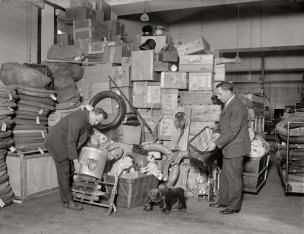
c/o shorpy.com
Students and teachers alike attended Assistant Professor of History Courtney Fullilove’s talk, “Scrambled/Lost/Rotten/Dead: Research on the Margins,” this past Tuesday, Nov. 19. In the lecture, Fullilove focused on researching materials traditionally neglected by historians and finding significance in the intersection of environmental history, history of science, and history of capitalism.
Fullilove opened the talk by reading a poem by Charles Wright. The poem, titled “Tomorrow,” established the talk’s theme: focusing on the ordinary and the obscure.
“The part of the poem that I really love are the first lines [on] the idea of the metaphysics of the quotidian, which is in fact in some ways the spirit of this talk,” Fullilove said.
Fullilove focused her talk on the archaic Dead Letter Office, an office created by the United Postal Service to deal with undeliverable mail.
“If you mail a letter and it doesn’t get to the proper recipient, it goes to the Dead Letter Office,” Fullilove said. “Whereas first class mail was under seal, meaning it was held private by the Fourth Amendment of the Constitution, third class matter (parcel posts) could be opened. The mail was disposed of, but the parcel posts [would be auctioned off]. So that’s the theme of the talk, trash picking in the Dead Letter Office. My contention is that there is no such thing as a trivial source.”
Fullilove utilized the Dead Letter Office to give insight into the lives of quotidian Americans.
“The reason I like the Dead Letter Office is because it is an accidental archive of failure, which was the normative experience of 19th-century economic life,” Fullilove wrote in an email to The Argus. “[…] It’s quite illuminating to tread through the catalogues of the rooms and ask why all this stuff ended up there. Even with a narrow focus on the history of agricultural development, you have to take note of how many packages of seeds end up in the halls of the Dead Letter Office. What does their presence there tell us?”
Fullilove’s research in the Dead Letter Office led her to discover the case of Junius Smith, an entrepreneur who attempted to bring the British East India Company’s tea industry to the deep U.S. South. According to Fullilove, Smith’s failure to displace cotton as the South’s primary cash crop is significant to the history of capitalism in the United States.
“We’ve been led to believe in these myths of free enterprise and the weak state in U.S. development whereby we have these Yankee entrepreneurs pulling themselves up by their bootstraps and coming up with great ideas and through the strength of private enterprise making the U.S. a great nation,” Fullilove said.
Fullilove continued to discuss the reality behind this myth.
“What…appears is that there is a lot of federal muscle behind those efforts every step of the way,” she said. “In fact, when American farmers succeeded it was because they were sort of sheltered from some of the risks of the market and given a big boost in research and development. But we don’t think of it in those terms.”
According to Fullilove, Smith embodied the recurring theme of the significance of the worker in the larger context of agricultural history.
“Farmers were the first biotechnicians, and had been for some ten thousand years,” Fullilove wrote. “It’s hard for us to think of them in these terms, because we’re accustomed to thinking about research and development as occurring in organized, institutional settings. But if we want to understand the grounds of that research, both historically and with respect for contemporary practice, we have to take seriously the contributions of agricultural people.”
The theme of the talk, drawing historical significance from the mundane, appealed to Abigail Shneyder ’17.
“I […love] the idea of finding significance and historical insight in nontraditional sources—in other words, trash,” Shneyder wrote in an email to The Argus. “I wanted to know what a few leftover seeds could tell me about American history[…]. [T]he idea of learning about the obscure history of forgotten objects does appeal to me. Everything can tell a story. I thought Professor Fullilove had a neat perspective on history that I’d never been exposed to before.”
As for finding context for these environmental stories, Professor of History, Medieval Studies, and Feminist, Gender, and Sexualty Studies Magda Teter offered a suggestion.
“You really need an imagination so you can try to imagine yourself in that moment in time you are reading about,” Teter said. “Don’t project your own reality, but try to project yourself in that moment. In the end, history is about good stories.”
Comments are closed